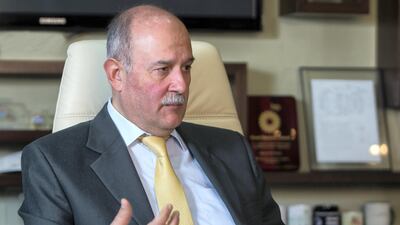Sharjah National Oil Corporation plans to issue a second licensing round for oil and gas concessions in the emirate as it seeks to end energy shortages and meet industrial demand.
The state-owned company will put out bids for oil and gas exploration onshore and offshore in areas in the east coast of the emirate, Hatem Al Mosa, chief executive of SNOC, said on Monday in an interview. The timing of the tender and the number of concessions are still undecided.
"It involves putting licensing rounds for current open acreage in Sharjah that’s not at the moment with any other companies and if any of the current occupied acreage becomes open in the future, we’d put it for the rounds too," Mr Al Mosa said. "We haven't decided the timing yet, it could be this year, it could be 2020."
Plans for further exploration follow Sharjah's first-ever competitive bid in which Italian oil and gas company Eni won three concessions earlier this month. The bid, which was launched last year, awarded Eni areas A, B and C onshore exploration concessions. State-owned Abu Dhabi National Oil Company also awarded this month two offshore exploration blocks to a consortium led by Eni and PTT Exploration and Production Public Company of Thailand in its first-ever competitive bid round.
___________
Read more:
Italy's Eni wins Sharjah oil and gas concessions in first-ever competitive bid
Adnoc awards two offshore exploration blocks in first-ever competitive bid
___________
Mr Al Mosa said he is confident in his company's ability to plug Sharjah's energy shortages as the emirate intensifies efforts for exploration.
"I feel very comfortable, with the plans already on the table and contracts we’re seeking, that we will be able to close 100 per cent of the chronic shortage of gas in Sharjah and hopefully have excess to satisfy industrial demand in the northern emirates," he said.
SNOC will undertake the pre-work, such as the seismic survey it conducted prior to tendering the first competitive bid, before announcing any future tenders.
"For any future bid rounds we want to do as much pre-work as possible to make sure it’s a successful bid round," Mr Al Mosa said. "We’re doing pre-work all the time. It's about when do we have enough work to make us comfortable to start this bid round."
Mr Al Mosa declined to comment on current gas production rates but said its "significantly lower" than the design capacity of its gas processing plant, creating the opportunity to ramp up production if a new discovery is made.
In the case of a "small" discovery of gas, the company would divert all of its production to the local market, he said.
In case of larger discoveries, it plans to divert the liquids pumped with gas to the market and put a portion of the gas back into the ground to "maintain the pressure (of reservoirs) and give maximum recovery of the liquids," he said.
Production of gas and condensate, a liquid found with gas, in the emirate is profitable and provides a "good revenue stream" for the government, he said, declining to comment on production costs.
SNOC is also working on developing an offshore liquefied natural gas import terminal to" close the long-term gap" in Sharjah energy demand and will continue to seek imports as long as demand exceeds local supply, he said. He declined to provide details on the project as the tender package is yet to be awarded. LNG is gas cooled to liquid to be transport by tankers.
Plans for gas storage is one of the focus areas for SNOC, which will allow it to store excess gas for use during summer peak demand.
SNOC plans to commission phase one of the gas storage project by the end of next year, he said. Phase one will have a target capacity of 50 million standard cubic feet per day with the total capacity of the total project to reach 200 million standard cubic feet per day.
Considering a potential stake sale in the wholly-government owned company is "not on our agenda," he said.


